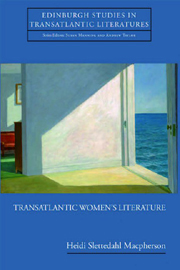Book contents
- Frontmatter
- Contents
- Acknowledgements
- Introduction: ‘No Region for Tourists and Women’
- Part 1: The Exoticised Other
- Part 2: Memoirs and Transatlantic Travel
- Introduction
- 3 ‘There is No World Outside the Text’: Transatlantic Slippage in Eva Hoffman's Lost in Translation
- 4 The Anti-Tourist: Jenny Diski's Skating to Antarctica and Stranger on a Train: Daydreaming and Smoking around America with Interruptions
- Part 3: Negotiating the Foreign/Re-Inventing Home
- Conclusion
- Bibliography
- Index
3 - ‘There is No World Outside the Text’: Transatlantic Slippage in Eva Hoffman's Lost in Translation
from Part 2: Memoirs and Transatlantic Travel
Published online by Cambridge University Press: 12 September 2012
- Frontmatter
- Contents
- Acknowledgements
- Introduction: ‘No Region for Tourists and Women’
- Part 1: The Exoticised Other
- Part 2: Memoirs and Transatlantic Travel
- Introduction
- 3 ‘There is No World Outside the Text’: Transatlantic Slippage in Eva Hoffman's Lost in Translation
- 4 The Anti-Tourist: Jenny Diski's Skating to Antarctica and Stranger on a Train: Daydreaming and Smoking around America with Interruptions
- Part 3: Negotiating the Foreign/Re-Inventing Home
- Conclusion
- Bibliography
- Index
Summary
Jennifer Browdy de Hernandez argues that, for postcolonial autobiographers, home is a ‘contested site on which the cultural conflicts of the larger society are played out in microcosm’. Such a recognition is important for an exploration of Eva Hoffman's transatlantic memoir, Lost in Translation. In this text, Hoffman's childhood home, Poland, becomes a landscape of desire, a place she can neither return to nor abandon. Indeed, part way through the memoir Hoffman expands at length on her desire for Poland, and its continual pull on her:
The country of my childhood lives within me with a primacy that is a form of love. It lives within me despite my knowledge of our marginality, and its primitive, unpretty emotions. Is it blind and self-deceptive of me to hold on to its memory? I think it would be blind and self-deceptive not to. All it has given me is the world, but that is enough. It has fed me language, perceptions, sounds, the human kind … no geometry of landscape, no haze in the air, will live in us as intensely as the landscapes that we saw as the first, and to which we gave ourselves wholly, without reservation.
Indeed, the very blurring of locations within Hoffman's memoir, as she moves from past to present almost seamlessly at times, indicates the way in which spaces are influenced, if not infected, by other spaces, and as home itself becomes a multiple site that resists final definition. Hoffman follows in a long line of critics and writers who see places as if on a continuum of being.
- Type
- Chapter
- Information
- Transatlantic Women's Literature , pp. 87 - 105Publisher: Edinburgh University PressPrint publication year: 2008



